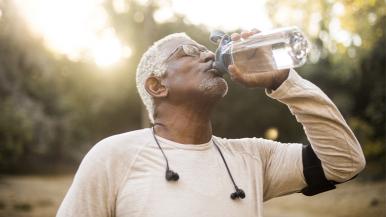Summer, fall, winter or spring — dehydration is a potential problem any time of the year. If you don’t drink enough before, during and after exercise, you can become dehydrated no matter the temperature.
Dehydration negatively impacts mood, attention, memory and motor coordination. Repeated bouts of dehydration can lead to disorders of the urinary tract and kidney problems, including kidney stones.
Kidney stones are the ninth most common reason that people visit the emergency room, according to Jonathan Huang, MD, urologist with Rush Copley Medical Group. The kidneys filter the blood and regulate electrolytes, so it’s important to keep them functioning properly. Symptoms of kidney stones include pain the in the lower back, nausea, vomiting, and blood in the urine. Pain can be severe: 100% of Huang’s female patients say that passing a kidney stone is the worst pain they have ever experienced.
What causes kidney stones
Stones form as a result of increased non-soluble substances in the urine. The most common type of kidney stone is calcium oxalate but other types include magnesium-ammonium-phosphate and uric acid stones.
Although other risk factors include hyperparathyroidism (high concentrations of parathyroid hormone in the blood), bacteria and medications, the biggest risk factor for stone formation is dehydration, which results in decreased urine output, which in turn leads to an elevated concentration of crystals in the urine. The crystals bind together to form stones.
Studies have found a higher incidence of kidney stones in the “stone belt” in the southern part of the country. It is believed that warmer weather and corresponding dehydration contribute to this higher incidence. That’s why it is important to stay well hydrated, especially when outside.
Preventing kidney stones
Although urologists can perform surgeries to remove kidney stones, Huang says their goal is to help prevent stones from forming in the first place. He gives the following recommendations:
- Stay hydrated. “The most important component of prevention is increased hydration,” he says. “We typically recommend about 100 ounces of water a day.” Although water is the recommended drink, he says any fluid is better than none. However, he cautions against colas, such as Coke and Pepsi, since they contain phosphoric acid, which can increase the risk of kidney stones. If drinking soda, he recommends clear sodas, such as 7-Up and Sprite.
- Go easy on the sodium. Because the kidneys have many electrolyte transporters, the more sodium in the urine, the more calcium in the urine. Huang says it’s important to decrease the amount of sodium in a your diet to less than 2,000 mg per day.
- Don't skimp on calcium. People often think they should decrease the amount of calcium in their diets. Huang says doing so could make the problem worse. The most common type of kidney stone is calcium oxalate stones, and oxalate is found in spinach and other green leafy vegetables. If there is not enough calcium in the intestines to bind the oxalate, it will be reabsorbed and excreted in the urine, leading to an increased risk of stones. “We advise our patients to eat four to five servings of dairy products daily, such as cheese, yogurt and milk,” the doctor says. This helps bind the oxalate in the gut so the calcium oxalate compound can be excreted in the stool.
- Eat plenty of fruits and vegetables. Fruits and vegetables contain citrate, which can help prevent kidney stone formation.
- Limit protein in your diet. Huang recommends that patients limit the amount of protein they consume to about 70 grams — about the size of the palm of your hand. He says this is especially important in patients who form uric acid stones since the breakdown of proteins causes uric acid.
Other benefits of staying hydrated
In addition to helping your kidneys stay healthy, staying hydrated is important for your overall health.
- It’s good for cardiovascular health. Dehydration results in decreased blood volume, making the heart work harder to pump a smaller amount of blood. As a result, your cells may receive less oxygen, making exercise and all activities more difficult.
- It’s good for muscles and joints. Water lubricates joints and is critical to providing nutrients to the muscle cells.
- It’s good for your skin, including improving skin's elasticity.
- It’s good for your memory, mood and motivation.
In short, staying hydrated is good for you — mind and body — so do something good for yourself no matter the season. Get outside and enjoy — just don’t forget to hydrate!




